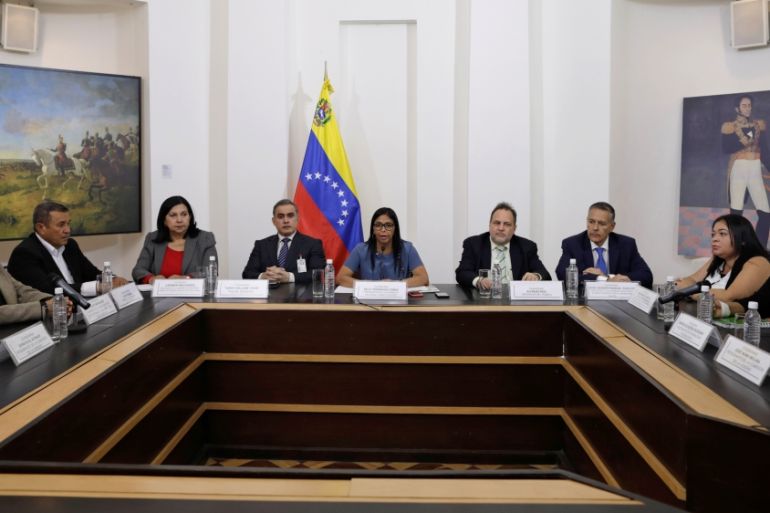Constituent assembly assumes power to legislate
Venezuela’s new constituent assembly supersedes the opposition-led congress, fuelling criticism of President Maduro.

Venezuela’s new legislative superbody on Friday gave itself the power to pass laws, superseding the opposition-led congress and fuelling criticism by government adversaries that socialist President Nicolas Maduro is consolidating a dictatorship.
Delcy Rodriguez, a Maduro ally and president of the constituent assembly, insisted the move did not imply a dissolution of the congress.
“Those lazy bums have to work. What we are doing is telling them: ‘Gentlemen, we are not going to let you take a holiday’,” Rodriguez said in a reference to opposition legislators.
South American trade bloc Mercosur condemned the assembly for usurping congress’ responsibilities, according to a statement released by Brazil’s Foreign Ministry.
READ MORE: Venezuela crisis – What’s next?
Mercosur founding members Brazil, Argentina, Uruguay and Paraguay will not recognise any measures taken by the assembly, the statement said.
The assembly had invited leaders of the existing congress to join the session. Congressional leaders did not attend, insisting it was fraudulently created and usurped their powers.
“(Congress) only obeys the constitution and the people. We do not recognise the constituent assembly, much less subordinate ourselves to it,” Freddy Guevara, an opposition politician and vice president of the congress, wrote on Twitter.
In practice, the move does little to change the existing situation. The Socialist-dominated Supreme Court has stripped power from congress and shot down nearly every law it has approved since it was taken over by the opposition in 2016.
Venezuela divided
Maduro pushed for the creation of the constituent assembly on promises it would bring peace to Venezuela after months of violent street protests that have killed more than 125 people.
Critics say the assembly was created to extend the rule of the Socialists, who face anger across the country over chronic food shortages, triple-digit inflation and a severe recession.
Protests have slowed since the July 30 election, partly because opposition leaders are in talks to present candidates for the gubernatorial elections expected in October. Many opposition supporters are also tired and demoralised.
|
|
Governments around the world have slammed the creation of the constituent assembly, with many accusing Maduro of seeking to ignore the will of Venezuelans who want a change of government.
The United States has slapped sanctions on top Socialist Party officials, accusing them, among other things, of weakening democracy and violating human rights. Washington has said it will consider sanctions against anyone who participates in the constituent assembly.
Al Jazeera’s Alessandro Rampietti – reporting from Bogota, Colombia – said the protests, and both domestic and foreign criticism “do not seem to be stopping this body from seizing power from other independent institutions in the country”.
Rampietti said the opposition is faced with few options; while they are calling for their supporters to rally on Saturday morning at the federal building housing both the parliament and the constituent assembly, there has been a major reduction in anti-government protest since the election of the constituent assembly.
“There is a feeling that people are demoralised and a bit tired after almost four months of almost daily protest, more than 120 people who died, the economic crisis in the country continues, and the government seems to become more powerful,” said Rampietti.
“And even if there is a lot of international pressure, more than 40 countries now who are accusing the government of President Maduro of essentially trying to turn the country into a dictatorship, nothing seems to be able to stop them.”
|
|